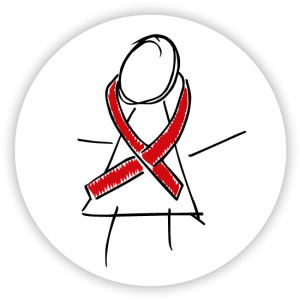Influence of early ART on antibody detection in children
1 August 2014. Related: Conference reports, Paediatric care, Paediatric Workshop 6 Melbourne 2014.
 Polly Clayden, HIV i-Base
Polly Clayden, HIV i-Base
Use of standard antibody tests in early treated children can lead to confusion according to data presented at the 6th International Workshop on HIV Paediatrics.
There have been reports of early treated HIV-infected children with suppressed viral load on antiretroviral treatment (ART) having negative antibody tests. It is unclear how frequently this occurs.
Investigators from Empilweni Service and Research Unit, Johannesburg and Columbia University, New York looked at HIV antibody in children enrolled in a clinical trial at Rahima Moosa Mother and Child Hospital, Johannesburg. They evaluated 104 samples from HIV-infected children who were under 15 months of age when they started ART and were now 3 to 6 years old and fully suppressed (<50 copies/mL). ELISA (GenescreenTM HIV1/2 version 2; Biorad) was used to perform the tests.
The children were a mean age of 8 months (range 2.2-15) at start of ART and had received ART for a mean of 5 years (range 3.4-6.4). Five of 104 had undetectable antibody (neg) and two had low antibody reactivity (low). Children with neg/low results started ART at a mean age of 3.7 months (range 2.2 to 4.9 months).
Seven of 43 (16%) children who started ART when aged <6 months had neg/low antibody. The investigators reported no association between duration of ART and antibody detection. They found significantly lower optical density (OD) among children starting ART <6 months than those starting >6 months of age: mean 3.6 vs 4.7 OD units, p=0.0002.
When the samples were retested with a more sensitive assay 7/7 children with neg/low antibody tested positive.
An additional 122 samples were included from children under 6 months when they started ART; mean age 3.9 months (range 3 weeks to 6.9 months) currently suppressed for a mean of 5 years. Of 226 children, altogether approximately 30% were antibody negative that started ART at <3 months; this proportion was approximately 5% for those that started ART 4-6 months of age.
The investigators concluded: “Use of standard antibody tests in early treated children can lead to confusion.” They noted that early ART might have several advantages and earlier infant diagnosis than is currently routine might be necessary.
Comment
The “confusion” referred to in this study is about whether or not early treated children with HIV antibody negative results are HIV positive and need continued treatment, or following the widely reported news of the Mississippi child (now back on treatment) “cured”.
The investigators noted that the prevalence of antibody negativity, even among children initiating ART <6 months of age, was lower than they had expected. All children had detectable antibody on a sensitive, low avidity assay. The investigators suggested that the unusual antibody profiles might mean that early ART could have influenced the ontogeny of antibody responses. They added: “Further investigation of antibody development, early treatment and establishment of viral reservoirs is warranted”.
Reference:
Kuhn L et al. HIV antibody detection in children who started antiretroviral treatment in infancy. 6th International Workshop on HIV Paediatrics. 18-19 July 2014, Melbourne. Oral abstract O_01.
http://regist2.virology-education.com/2014/6thHIVped/4_Kuhn.pdf (PDF)

